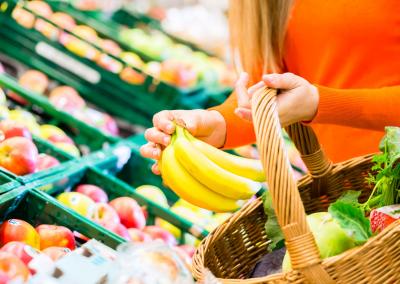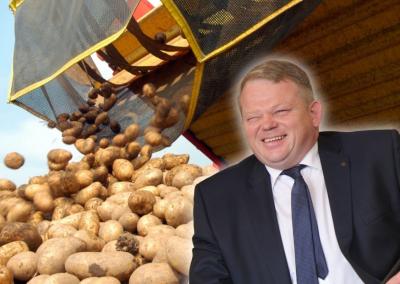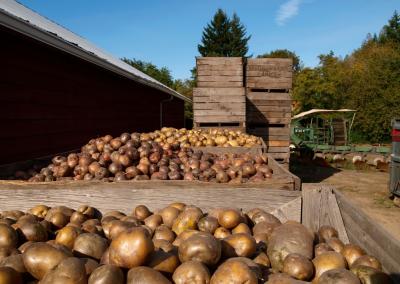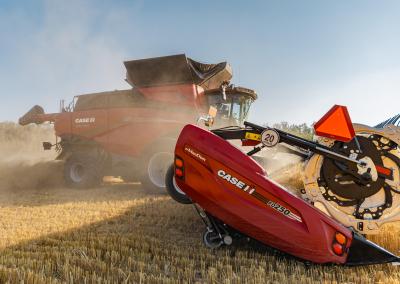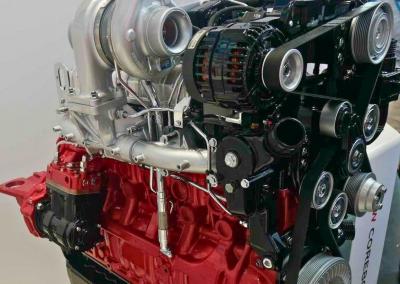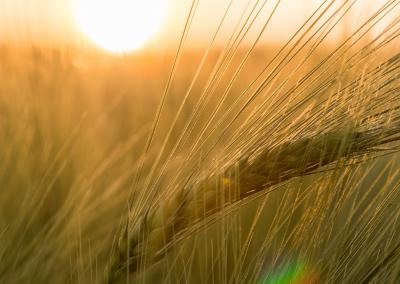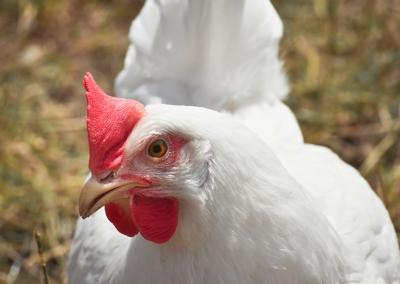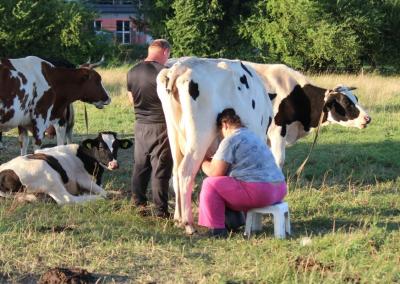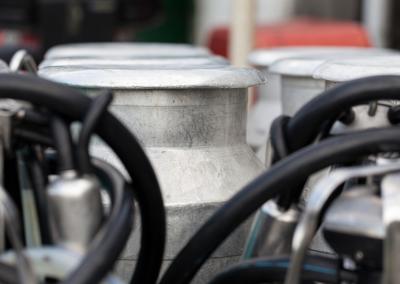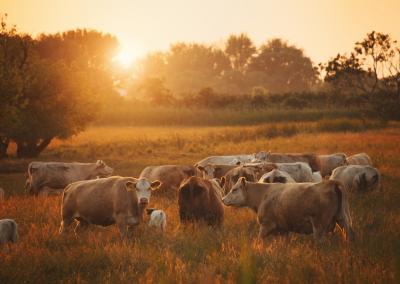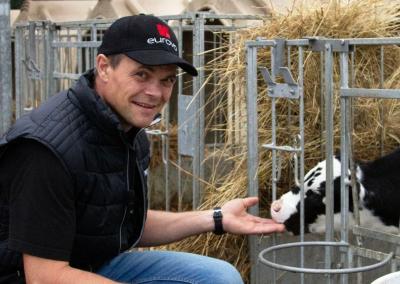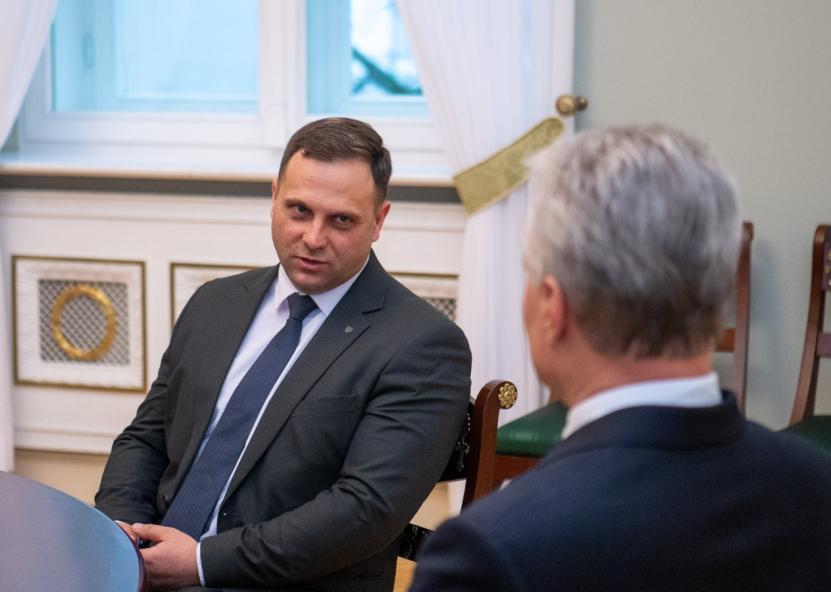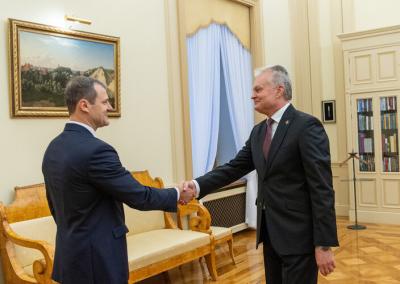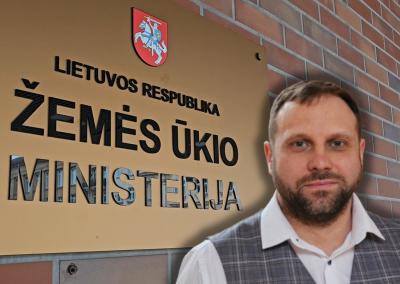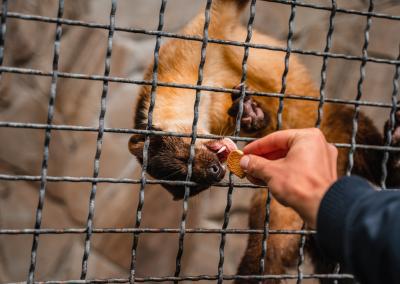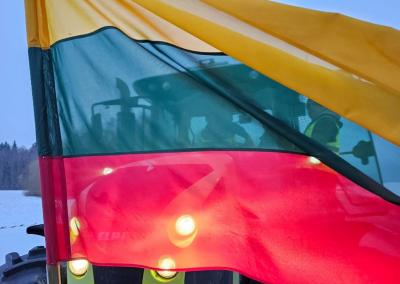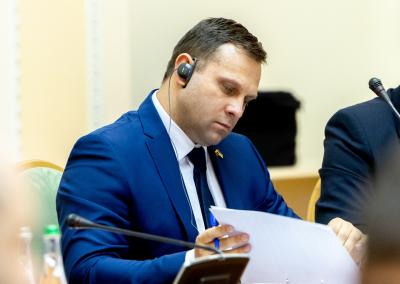I.Hofmanas: I see the whole, the whole of agriculture
Almost a year ago, after leading farmers in a protest against the agriculture policies of Ingrid Šimonytė's government, the Minister of Agriculture-designate Ignas Hofmanas says farmers are already doing a lot to protect the environment today. However, he says there could be fewer environmental requirements.
„I see the whole, the whole of agriculture“, – said I. Hofman in an interview with BNS.
I. Hofmanas says he will give up the management of his grain farm in the Radviliškis district when he becomes minister.
On the issue of the ban on fur farming in Lithuania, the Minister-designate says that entrepreneurs must be properly compensated. He also believes that such a ban makes no sense if there is a demand for fur animals – this business will continue to exist, but will only move to other countries.
Furthermore, Mr Hofman argues that promoting organic farms is a priority, but that over-promoting them financially could be counterproductive.
– What will you do differently than former Minister of Agriculture Kęstutis Navickas or other former ministers?
– First of all, differently – it is to maintain good relations with the social partners, which is the opposite of what Navickas did – he wanted to break them. I think we have to see agriculture as a productive sector, even though there is an attempt here to make it sound like I am only in favour of intensive farming (BNS). I am in favour of all farms that are productive and add value, including those where people farm for their own needs. There is a social aspect to this, which I would suggest separating out.
I think that there will not be any radical changes here, it will just be a slight change of direction, a change of vision, a change of understanding, and it is also changing in Europe after the farmers' protests, that the green course, as it has been pushed, as it has been wanted, it has been a fiasco, and let's face it, and this is acknowledged by the highest leaders in the European Union, and it is going to have to change, and the Lithuanian national agricultural policy should also adjust a little bit.
– Some environmentalist organisations have said they fear that you will not pay attention to small and medium-sized farms, to the declining livestock industry, to environmental protection. How do you assess their fears?
– These are unfounded fears that do not exist. I see the whole, the whole of agriculture – important and small farms or medium-sized farms, as they are trying to say here, of course, I am only in favour of a diversified Lithuanian agriculture and that we all have to fit in. And in the same way, livestock farming is a very important branch and it is shrinking.
These allegations are completely unfounded, because we (BNS) both protested and fought for this. There are completely unnecessary fears here about livestock farming going down, about the problems in the dairy sector. Difficult issues such as livestock farming, for example, or farms going out of production. I think that if it were easy to solve, someone would have solved it before me. We will look for ways, but that does not mean that I am not for those, I am for those. That is certainly not the case. Both animal husbandry and small farms are important.
– Agriculture is already doing a lot for the environment today – this includes intercropping, cropping, a more diverse rotation, legume cultivation, leaving swaths of undergrowth, tillage is being used very extensively, there is probably three times as much land being cultivated in the fallow period, which has exceeded the previous expectation, and there is more than the planned amount being cultivated in this way. As to what other steps could be taken towards greater sustainability, it is very difficult for me to say right now. It's something to think about, to look for, but I think that agriculture is doing a lot these days.
For example, we could also think about liming the soil, which means improving the condition of the soil, so that it accumulates more plant matter. This soil can grow more plant matter, which means that we lock up more carbon, we absorb more CO2, and it is one of the measures that benefits the soil, benefits the farmer, and benefits the environment.
– And where is the environmental squeeze?
– I think we have very few plant protection products in Lithuania, which raises other problems, for example, we had a meeting with beekeepers not so long ago, their honey exceeds the standards of one pesticide, although they themselves say – if there were more registrations, or if they had been registered earlier, there was not this problem before. That means that when we also ban a lot of products, then other problems arise and I would say that we are a little bit too strict here.
Now, in fact, the requirements have been lowered a little and the European Commission has already allowed the 5% phase-out, which was also, shall we say, not very logical. It is better to grow leguminous crops within that 5%, which store nitrogen in their roots, and in this way we improve the soil, what are the economic benefits. This is where I think it was misunderstood.
The controversial point about surface water protection zones (...) – environmentalists, the public say they want bigger zones. Good. But imagine if you are the owner of that land, which means that they take away, for example, 30 acres or half a hectare of land, (...) there will be a regulation such that you are forbidden to work on that land, you cannot use it anymore, which means that you lose your income, you lose your assets for their direct purpose, and there is a balance to be struck there too. We have proposed a form of landless tillage, so maybe that would be a compromise proposal.
– Farmers highlight the problem that natural persons are limited to 500 hectares of land, but legal persons can circumvent this limit. How would you address this problem?
– Yes, there is that problem and I am of the opinion that the law on land acquisition up to 500 hectares must work the same for everyone and must not be circumvented. It would be necessary to analyse those cases, but yes, we hear that it is. (...) There has been talk of removing the restriction altogether, so I am against it, there must be a restriction. We are a small country, we have to limit that land potential and there has to be a more even distribution, not only of farmers, but of landowners in general.
– Earlier you said that Lithuanian farmers receive the lowest payments among EU countries. How can we change this situation?<– Yes, we receive one of the lowest payments in the EU. What could be done is that there is now a good system for the distribution of payments for eco-schemes, for additional ecological activities, which means that people are rewarded or paid extra money for intercropping, for growing leguminous crops, for the use of bearimic technology.
What to do to make the envelope bigger in general, there is a new financial period coming up from 2027, when we will be negotiating bigger direct payments, not only payments, but bigger funding in general, so we will do our best (...) to make sure that Lithuania negotiates a bigger envelope for the direct payments, for the rural development, so that our farmers will be on a more equal footing in that competitive fight.
– Less than a year ago, you led farmers to protest against the government's agricultural policy. What will you do if such a protest is staged against you?– The first thing to do is to avoid a situation where a protest would happen, or the preconditions for a protest to happen. You would probably have to communicate properly, talk properly to the community, to the social partners, to the organisations and avoid that. But if that were to happen, I would just look for solutions, I would go out and meet, and if there are no more solutions to be found, then maybe the minister can't do anything anymore, it's just a case of letting others try.
– You were quite angry with the Chamber of Agriculture throughout the protest. Now you will have to revive that relationship. How do you plan to do that?
– We have not been formally angry. It's just that the campaign was organised by the Lithuanian Agricultural Council, without the Chamber of Agriculture, so maybe some farmers or some leaders of some organisations had some kind of confrontation with the Chamber of Agriculture, but there was not really any official conflict.
What I will have to do is, of course, I will have to listen to both sides, to both organisations, and who knows, maybe after some changes, maybe the farming community, the self-government of farmers will be clarified, and the corners will be rounded a little bit, and maybe the problem will be solved completely, and maybe the gulf will be widened. The Chamber of Agriculture, they themselves accept that there are problems, that they need to be addressed, and they understand that they, too, will have to change. That is how I would see it, that change will be needed, but I will remain neutral.
– You also said after the protest that the only issue that remains unresolved is the milk market. What is the situation now and what changes would be needed?
– There is some improvement in the milk purchase price, the crisis is not as deep as it was, but we still have farms going out of production. We need to look at why this is happening, what are the reasons – is it just financial reasons, or maybe there are social reasons as well, or other reasons why farms are closing down and going out of production.
Solutions should be sought in the long term so that dairy farms and the dairy sector do not find themselves in crisis situations where the farmer has to produce milk below cost. Nobody wants to take on that responsibility, the financial burden, to reduce their profits, neither the trader nor the processor, but the farmer – that is a link that can be unprofitable.
– There have been suggestions, for example, that the farmer, the milk producer, should get a share of the final milk price. Would you support such an idea?– Yes, I would support the so-called Spanish option – a fair distribution of the price along the chain (...). At the moment it is something like 35% – the trader takes the biggest share, the processors take the rest. Of course the processors bear the costs, but nobody sees the farmers' share, nobody wants it. Again, there is a stronger country, a weaker country, there is a price, you can't survive anymore, destroy your farm, but we, God forbid, will not do anything.
– You yourself have a grain farm. How do you plan to avoid conflicts of interest?– Of course it is the case that I have to give up my direct activity of farming in some legal form. I will not be the first minister who is both a minister and a farmer. I think that this is solvable in some legal way – the right form is found and I will have to step back from the management of the farm, from the decision-making on the farm, that is natural. (...) It will have to be arranged in such a way that there is no conflict of interest.
– Let's talk about bureaucracy. Farmers often talk about the need to cut red tape, especially with crop declarations. What solutions do you see here?
– Minister Kazys Starkevičius has already done a little bit in this area, he has made it easier to fill in the registers, he has made it simpler, and he is moving towards making other things simpler. I hope that this initiative will be maintained, for example, the farm works register, is it really necessary or could it perhaps be simpler. A lot of these registers are kept, but nobody needs the information in them, it is just an obligation for the sake of an obligation. What is the purpose, what is the need for them – it is not clear.
For example, a farmer can be inspected by the services (together – BNS) – and by the Plant Production Service, the Veterinary Service, and the National Payments Agency. Perhaps there needs to be a communication between the three services, if one is checking, why check the farmer a second time, they could exchange information.
The simple requirement that when we use plant protection products on flowering crops we have to do it at night and everything is strict, okay, but we have to notify the beekeepers, we have to register two days before. But we do not know what the weather is going to be like in two days' time. If it rains, then we have to move it to the next day, but again we have to give no more than two days' notice.
Maybe, for example, that pre-registration could be waived, it would be enough for farmers themselves to comply with the requirements not to use daytime plant protection products on flowering plants. If they do apply during the day, the services would impose sanctions or fines. However, this registration is not necessary.
– What is your view on the situation with fur farms, do you agree with Viktor Pranckietis' position that the ban should be postponed until 2033?
– I would see the question as – if the public, for some reason, in this case – for moral reasons, decided that this business is not appropriate, not acceptable – well, we can legislate for that, but it should be in a civilised way, with proper compensation for these people when they go out of business. I would put it another way – when we do not ban the use of furskins or the importation of furskins, we are not solving the problem. Then the animals will be bred somewhere other than in our backyard, if there is demand. If there is a demand in the market, people will carry fur. It will probably be in third countries, where animal welfare standards are quite different, where we have no control. This is a rhetorical question – perhaps it is better to raise here and control it properly than to move this production to third countries. When the EU started banning game farms, there was a lot of investment in Russia, in Kazakhstan, in this business. If, as the defenders of this idea say, it is obsolete, then let the market sort it out. If nobody needs fur, nobody will breed it. – And how would you plan to promote the development of organic farms?
– Without subsidies it is very difficult for them to survive in the market. We need to look at what are the problems that are causing farms to pull out of production and how to encourage them. I think that subsidies alone will not solve the problem, because the more you subsidise a farm, the less motivation it has to harvest. Imagine, you get a payment per hectare, there have been cases long before where you grow organic currants, you get a hefty payment and you don't even harvest them, or you grow organic pumpkins, you get a payment and you don't use the pumpkins for food, you just put them back in the soil, you don't harvest them.
The subsidy has to be handled very carefully, sometimes a large subsidy does not motivate the farmer to harvest – why should I harvest, I will get a small reward, it will cost me to harvest, it will cost me to market, and I am getting a good payment anyway. Let them stay in the fields. I would also see a societal responsibility here. If the public says that we want organic products, organic food, then the public itself should consume more of it, because no amount of subsidies will pay for it. I do not think that organic farming will grow very much in the future because, I am almost certain of it, there will be a new form of farming – sustainable farming. It is something between organic and intensive, with less intensive production, less use of inputs: plant protection products, fertilisers. – Should agricultural exports to distant countries such as the USA or Taiwan be encouraged? – Very important. As long as there is an opportunity to export, that is very good. We are an agrarian country, we do not have other large resources that we can sell and thus get money. We have no oil, no coal, no gas. We only have a strong agrarian and agricultural potential and we can produce more than we need. It would be very important to discover new markets for exports. We are very strong in cereals, we have the right climate and geography, we have a port, we have infrastructure. It is a product that can be sold all year round, not like meat or milk, which require special storage conditions, processing. Yes, with vegetables, we find it difficult to withstand competition from countries further south. There has been talk that we might export chicken to Taiwan, maybe cheeses. We need to look in detail at which market we can go to with which product and whether we can produce it, whether we can offer it. – In your opinion, is it more of a dream to export chicken to Taiwan? – Maybe it's more of a dream, because it's really long distance and expensive logistics. However, Lithuania, for example, is famous for its cheeses and cheese is a product that can already be transported and exported logistically. I could see that, but more to Asia, somewhere closer. Those far away places – the USA, South or North American continents – it's difficult here because the product has to be so unique, so valuable that it is worth transporting so many kilometres.
– Thank you for talking to me.![]()




